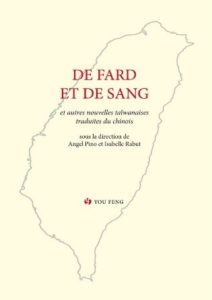 A few days ago, we mentioned “The Historical Anthology of Modern Taiwanese Literature”, four volumes under the direction of Isabelle Rabut, professor at INALCO and Angel Pino, professor at the University of Bordeaux Montaigne. The last two volumes, “De fard et de sang” and “Félix s’inquiète pour le pays”, will be presented by the publishers at Librairie Le Phénix in Paris, on Friday, February 1 at 6 p.m. and at the Taiwan Cultural Centre on Sunday, February 10.
A few days ago, we mentioned “The Historical Anthology of Modern Taiwanese Literature”, four volumes under the direction of Isabelle Rabut, professor at INALCO and Angel Pino, professor at the University of Bordeaux Montaigne. The last two volumes, “De fard et de sang” and “Félix s’inquiète pour le pays”, will be presented by the publishers at Librairie Le Phénix in Paris, on Friday, February 1 at 6 p.m. and at the Taiwan Cultural Centre on Sunday, February 10.
In the last volume, we mentioned the short stories by the Zhu sisters, Su Weizhen, Ping Lu and Zhang Dachun. “De fard et de sang” (1) is perhaps a more complex set, of comparable quality, but one can wonder about the criteria for selecting works that are most often related to nativist literature.
The remarkable introduction by the publishers mentions the island’s economic growth, urbanization, education but also the fundamental changes in Taiwan’s international position after the establishment of diplomatic relations between the United States and China.
The death of Chang Kai-shek in 1975 made it possible to liberalize the regime and increase the weight of ethnic Taiwanese in government. Independents, opponents to Guomintang, stood for election and succeeded in founding the Progressive Democratic Party.
– “Nativist literature”:
The publishers emphasize the role of the literary supplements of two daily newspapers and five publishing houses that will publish young writers in the 1960s and 1980s. The movement of “nativist” literature evokes what is local, as opposed to what comes from the outside, the land, the countryside and not the city.
“Literature can and must fulfil a social mission, by witnessing to the experiences of ordinary people, especially the most humble” (p. 18). Geopolitical setbacks favour this movement; it is necessary to rely on local realities and cultures. Some magazines, such as “Le Trimestriel de la littérature”, of which Huang Chunming is a close collaborator, will disseminate this literature despite the accusation of communist propaganda.
The controversy over local literature in 1977.1978 brought together the proponents of this literature against writers close to Guomintang or the modernist movement (Wang Wenxing). This nativist movement is also a reaction against American neo-colonialism and is opposed to the imitation of Western writers, to a literature based on the exploration of the inner world.
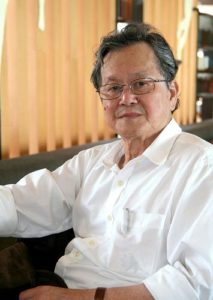 Relations with China are a divisive issue: some criticize excessive regionalism, fear a separatist position and only speak of “Chinese literature inTaiwan”; others emphasize the particularities of Taiwanese culture and works written in languages other than Chinese.
Relations with China are a divisive issue: some criticize excessive regionalism, fear a separatist position and only speak of “Chinese literature inTaiwan”; others emphasize the particularities of Taiwanese culture and works written in languages other than Chinese.
– Hwang Chunming: “The drowning of an old cat” (2):
In January 2014, I greatly appreciated the collection of short stories “I love Mary” (3); “Drowning…” is a text of comparable quality. In the village of “La Source Pure”, near the small town of Jiezai, villagers and visitors come to swim in a small pond. The village elders gather around Uncle Asheng who has just learned that those in Jiezai have raised enough money to build a swimming pool using the water from the Dragon’s Eye well, which then risks drying up.
Meeting protected by the police, speeches in Mandarin that few villagers understand, Asheng refuses the project; supported for a time, he cannot block the construction. Everything will sadly end with his final protest, which is also shows his inability to live in a new world.
– Li Yongping, a Sino-Malaysian:
An interesting character, born in 1947 in Kuching, Malaysia on the island of Borneo; he studied at university in Taiwan and then for six years in the United States. He is with Zhang Guixing, one of the representatives of Sino-Malaysian literature. The break between Malaysia and China after 1949 led young Malaysians of Chinese origin to pursue their higher education in Taiwan to deepen their culture of origin.
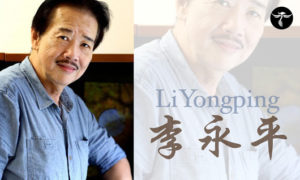 This movement was strengthened after the anti-Chinese riots of May 1969 in Malaysia and the implementation of the New Economic Policy (NEP), which limited the economic rights of the Chinese community. Li Yongping and Zhang Guixing abandoned their Malaysian nationality. Li Yongping, nostalgic for traditional Chinese culture, died in 2017 without having been able to complete a wuxia novel.
This movement was strengthened after the anti-Chinese riots of May 1969 in Malaysia and the implementation of the New Economic Policy (NEP), which limited the economic rights of the Chinese community. Li Yongping and Zhang Guixing abandoned their Malaysian nationality. Li Yongping, nostalgic for traditional Chinese culture, died in 2017 without having been able to complete a wuxia novel.
Li Yongping began writing under the influence of Wang Wenxing and published in 1986 the novel “The Jiling Chronicles” (4) which made him famous. The text “Rain in Sunny Weather” (5), constitutes chapter 2 of the Jiling Chronicles. These revolve around the rape of Changsheng by a thug Sun Sinfang, then her suicide. Her husband, Liu Laoshi, the coffin maker, returns to the village, mutilates Sun Sinfang’s wife; rumours are that he is back in the village…
– Hong Xinfu (1949-1982): “The End of the Show” (6)
The author is a major representative of nativist literature. His work is very focused on the Changhua and Taichung regions. A very beautiful short story about Taiwanese opera, gezaixi, a symbol of traditional popular culture.
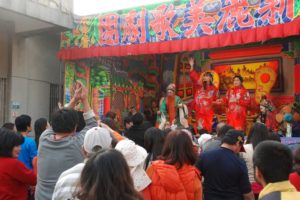 This opera is dying, a troupe of twenty people, very famous in the past, plays for some spectators gathered in front of temples. Less scenery but the passion is still there, especially for Uncle Jinfa, the boss of the troupe. Many actors leave the profession to sing (oh sacrilege!) pop songs and finally earn some money. They also sing for the funerals. Finally, in opera costume, Xinjie has to sing a pop song to attract audiences….
This opera is dying, a troupe of twenty people, very famous in the past, plays for some spectators gathered in front of temples. Less scenery but the passion is still there, especially for Uncle Jinfa, the boss of the troupe. Many actors leave the profession to sing (oh sacrilege!) pop songs and finally earn some money. They also sing for the funerals. Finally, in opera costume, Xinjie has to sing a pop song to attract audiences….
A good piece; opera is part of the troupe’s life; Cuifeng breastfeeds her baby before returning on the stage. Children at school are mocked by their little friends because they appear in a play. Actors improvise to allow an actress to leave the stage and console her crying child…
– Wang Dingguo, “The Fall” (7)
He was born in Lugang (like Li Ang) in 1955. After a business school but also the publication of several short stories, he began a career as a businessman and founded his own company. He will publish again in 2003 while managing the construction company he founded.
The theme of the flow of memories near death is a classic one, but this text is very clever. Four people in a car at night on a dangerous mountain road. Off the road, two wheels hanging in the air, the driver has been ejected. The narrator is in the back seat with his former rival, whom he has long contested to marry Neige, a marriage that has not made them happy. He lets his rival out at the risk of unbalancing the car; he is “just sad, very sad”.
– Li Ang, “De Fard et de Sang” (8) :
She is one of the leading writers in Taiwanese literature. Born in 1952 in Lugang into a wealthy family with two older sisters, both writers themselves. Books and short stories very unconventional for the time. Sex, power and violence against women are her trademark.
Three of her novels are translated into French (two into English by Howard Goldblatt), including the famous “La Femme du Boucher” (1983), inspired by an incident in Shanghai: an orphan girl married to a butcher is suffering violence until she kills him with his knife and slices him up!
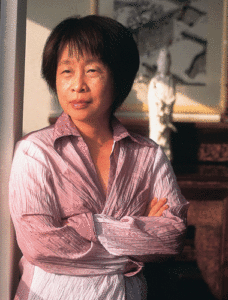 The short stories are of very high quality but the most famous (” Flower Season “, “Curvaceous Dolls “) are only available in English. Li Ang’s life and her relationship with politics and the opposition party are very interesting, we will come back to this later.
The short stories are of very high quality but the most famous (” Flower Season “, “Curvaceous Dolls “) are only available in English. Li Ang’s life and her relationship with politics and the opposition party are very interesting, we will come back to this later.
“De Fard et de Sang” is a good long story, published in 1997, that revolves around a commemoration of the massacres of February 28, 1947, during which Chang Kai-shek’s troops killed thousands of revolted Taiwanese.
Photos for this commemoration, photos of Mama Wang whose fiancé was shot. Pregnant, she gave birth to a boy who became a remarkable doctor. Maman Wang is an opposition political activist who deals with make-up and sewing.
She prays in front of her son’s coffin, known for his homosexual relations in the New Park (made famous by Bai Xianyong (12)). She’s going to dress him, make him up. A fire broke out in the building, “so many dead, so many souls in pain, it has been almost fifty years since anyone appeased them, they remain in the city with nowhere to go, they wander and search everywhere for replacements” (p. 273).
* * *
Other short stories appear in this volume n°3, including Zhang Xiguo’s “Les Immortels”, Song Zelai’s “Funeral in Micheng” and for me, a disappointment, Wuhe’s “Exhumation”, a short story that did not win me over, while his novel “Les Survivants” (13) is one of the most beautiful books I have read in recent years.
Bertrand Mialaret
(1) “De fard et de sang”, Anthologie de la prose romanesque taiwanaise moderne sous la direction d’Angel Pino et Isabelle Rabut (volume 3) ; Editions You Feng 2018, 460 pages.
(2) Huang Chunming, “La noyade d’un vieux chat”, translated by Isabelle Rabut and Angel Pino; pp. 41-72.
(In English, “The drowning of an old cat”, translated by Howard Goldblatt in “The Taste of Apples”, p.11 to 31. Columbia University Press 2001, 250 pages).
(3) Huang Chunming, “I love Mary”, translated by Mathieu Kolatte. Bleu de Chine-Gallimard, 2014, 200 pages.
(4) Li Yongping, “Retribution, The Jiling Chronicles”, translated by Howard Goldblatt and Sylvia Li-Chun-lin. Columbia University Press 2003, 246 pages.
(5) Li Yongping, “Pluie par temps de soleil”, translated by Isabelle Rabut and Angel Pino; pp. 129-159.
(6) Hong Xinglu, “La Fin du Spectacle”, translated by Florinne Maréchal; pp. 165-203.
(7) Wang Dingguo, ” La Chute”, translated by Shao Baoqing; pp. 411-459.
(8) Li Ang, “De Fard et de Sang”, translated by Melie Chen ; pp. 217-285.
(9) Li Ang, “La Femme du Boucher”, translated by Alain Peyraube and Hua-Fang Vizcarra. Flammarion 1992.
(10) Li Ang, “Le Jardin des Egarements”, translated by Alain Lévy. Editions P. Picquier, 2003, 280 pages.
(11) Li Ang, “Nuit Obscure”, translated by Marie Laureillard. Actes Sud 2004, 193 pages.
(12) Bai Xianyong, “Garçons de Cristal”, translated by André Lévy, Flammarion 1995, 370 pages.
(13) Wuhe, “Les Survivants”, translated by Esther Lin-Rosolato and Emmanuelle Péchenard; Actes Sud 2011, 295 pages. (In English, « Remains of Life », translated by Michael Berry, Columbia University).





